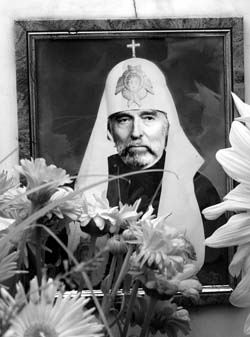The dissident clergyman
Patriarch Volodymyr passed away 12 years ago
Twelve years ago a grave appeared in the center of Kyiv, on St. Sophia Square, at the foot of the belfry of St. Sophia’s Cathedral. It contains the earthly remains of Patriarch Volodymyr of Kyiv and All Rus’-Ukraine. He was the second patriarch in Ukrainian history. For many Ukrainians, believers and agnostics, this grave became a symbol of our modern public life and the effectiveness of the “powerful” Ukrainian government that was not able to protect its finest subjects even in death. The desolate condition of his grave continues to appall Ukrainians as well as foreign guests, as does the site that was chosen hastily, with indifference and disrespect. Despite all the modest adornments that were added later, Patriarch Volodymyr’s grave is a constant reproach to every Ukrainian.
I was fortunate enough to interview Patriarch Volodymyr of Kyiv and All Rus’-Ukraine. As we talked, I found it hard to believe that this enthusiastic, friendly man who took an interest in every aspect of life, had spent almost 25 years in Soviet prison camps and exile; that when he was released, in conditions of Soviet “freedom,” he was constantly under KGB surveillance. I am also convinced that the few years that Patriarch Volodymyr was destined to live in independent Ukraine were not easy ones. There were often tragic, owing to the rift in the Orthodox community, ongoing intrigues and rivalries (that were anything but Christian-like), fighting for church posts, with clergymen taking sides with various churches (as in Muscovy’s Time of Troubles), and so on. In fact, those years of independence proved to be a trial for our Orthodox clergy, and it may be safe to assume that they did not pass muster. (Among the reasons, in my opinion, is that our clergy has traditionally taken orders from secular authorities, with the exception of certain periods and several figures.)
Vasyl Romaniuk, the future Patriarch Volodymyr, started on his road to the Soviet Calvary in 1944, at the age of 19, when he was sentenced to 10 years’ imprisonment in the GULAG (Kolyma), on charges of maintaining links with the Ukrainian Insurgent Army (UPA), although he had never taken part in its operations. After serving his sentence, he received a five- year term of exile in Magadan. He would later recall those years as “my universities.” While he was in exile, Romaniuk met people who became his teachers, among them men of letters, scholars, scientists, even academicians. That was when he became aware of his calling: to serve our Lord and the Ukrainian Church. However, he was ordained and assigned a parish only in 1964. Addressing his parishioners, he spoke the truth, urging them to honor their national religious traditions and to try and live in accordance with His Commandments. He was rearrested and sentenced to seven years in a prison camp in Mordovia, followed by three years of exile in Yakutia. The Rev. Romaniuk was released with terminal heart disease.
During his second imprisonment Rev. Romaniuk established close contacts with the human rights movement. He wrote letters and issued statements to various international organizations, exposing violations of human rights in the USSR, including the right to freely profess one’s religion. This dissident clergyman soon became known in the West, where Metropolitan Mstyslav launched a campaign for his release. The times had changed, and the Soviet government was forced to free Romaniuk and even allow him to leave the country. Abroad, he won considerable respect from the Christian community. He was granted an audience at the White House and was given the floor in the Canadian parliament. An English version of a collection of his sermons and messages, entitled A Voice in the Wilderness, was published in Toronto. But when events took their impetuous course in Ukraine, when the Ukrainian Church could finally raise her head, Rev. Romaniuk returned to Ukraine, “so that I could have time to do something for the Church and for Ukraine.” In 1990, he took monastic vows under the name of Volodymyr and was ordained a bishop shortly afterward.
In 1993, after the death of Patriarch Mstyslav, a group of bishops revived the Ukrainian Autocephalous Orthodox Church (UAOC) and Patriarch Dymytrii (Yarema) was elected to head it. Its other part, the Ukrainian Orthodox Church of the Kyiv Patriarchate (UOC KP), was headed by Volodymyr (Romaniuk), who was enthroned at St. Sophia’s Cathedral as Patriarch of Kyiv and All Rus’-Ukraine.
Patriarch Volodymyr held his post for less than two years. He was extremely sociable, easy to deal with, and amazed people by his kind and understanding approach. His office was open at all hours, for everyone regardless of social status, rank, or position. He would scold his office clerks to make sure that all visitors were admitted and given an audience. People would approach him on the street, asking favors that he never denied. For this man the world of material values and needs did not exist.
Patriarch Volodymyr was pained to witness the rift in the Orthodox world and did his best to improve the situation, particularly in regard to the UAOC. Several days before his death, contrary to protocol and personal feelings, he visited Patriarch Dymytrii at his residence. They reached an understanding after a long discussion; they even agreed on a joint action plan aimed at achieving Orthodox unity. But then Patriarch Volodymyr’s sudden death destroyed all their plans.






